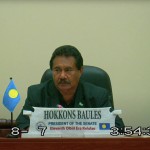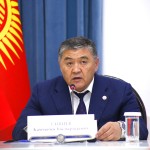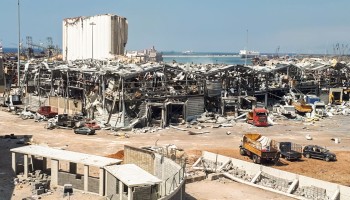Reported by
The investigation into the massive 2020 Beirut Port explosion is “moving forward seriously and quickly,” Lebanese Minister of Justice Adel Nassar said in an interview, after the inquiry stalled for years.
Nasser made the comments to OCCRP’s Lebanese media partner, Daraj, after news broke this week about the arrest of the man whose ship carried the volatile chemicals that caused the devastating explosion in 2020.
Igor Grechushkin was arrested in Bulgaria on September 5 after arriving on a flight from Cyprus, where he holds a passport, along with Russian citizenship.
Nasser said Lebanon will seek the extradition of Grechushkin, who leased the ship that brought nearly 3,000 tons of ammonium nitrate into Beirut Port, where it was offloaded and put into storage before exploding.
“A file is being prepared and we are expediting it. I’m following up closely; it’s a request for extradition, and I have also requested to meet with the Bulgarian ambassador,” he said.
“I’m handling the logistics to make the request proceed as quickly as possible. By next week, the extradition request should be with them,” Nasser added.
There has been heavy criticism for lack of progress in the investigation of the Beirut Port blast, one of the most powerful non-nuclear explosions in history. At least 218 people were killed and about 7,000 were injured, while the explosion leveled large swaths of the city.
The ammonium nitrate at the root of the blast arrived aboard the Moldovan-flagged ship Rhosus in 2013. It was impounded in a port warehouse, where repeated warnings about its unsafe storage were ignored for seven years. After years of delays, the investigation into the explosion has gained traction under a new government formed earlier this year.
“Ever since I took on the investigation file, the process has actually moved forward very rapidly. All cooperation among judges has been restored, and I believe the victims’ families know just how much of a priority this is,” Nasser said.
Ekaterina Dimitrova, Grechushkin’s lawyer in Bulgaria, told OCCRP that her client had travelled freely with his family over the past few years before being arrested in the capital, Sofia, earlier this month.
“An interesting fact is that Igor Grechushkin traveled to Lebanon and was interrogated, but was not arrested,” she said. “Investigators from Lebanon were sent to Cyprus to work with him. He told everything he knew about the case and there was no request for his detention.”
Melhem Khalaf, a Lebanese Member of Parliament and former head of the Beirut Bar Association, told Daraj that Grechushkin’s arrest “confirms that the case is still alive and moving effectively inside and outside Lebanon.”
“However, Grechushkin's arrest in Bulgaria — while providing momentum and a practical opportunity through extradition or interrogation — does not in itself constitute a magic solution unless the judicial procedures are quickly completed, and the internal obstacles impeding the course of justice are removed,” Khalaf said.
Zeina Wakim of Accountability Now, an non-profit dedicated to ending impunity in Lebanon, was also encouraged by Grechushkin's arrest, as it showed the judiciary “can reach all sorts of actors, anywhere in the world, should it want to.”
But she added that “the judiciary needs to extend the investigations to the larger corruption network that led to the explosion, and not only focus on the negligence in the warehousing.”
“Greshushkin is only one piece of the puzzle,” Wakim said.






